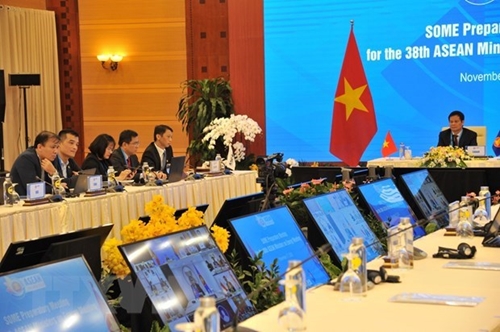In his opening remarks, Hoang Tien Dung, Director of the Department of Electricity and Renewable Energy at Vietnam’s Ministry of Industry and Trade (MoIT), emphasized that the ASEAN Center for Energy and the ASEAN Secretariat have coordinated with countries to agree on content relating to energy activities in 2019-2020 and the ASEAN Plan of Action for Energy Cooperation (APAEC) for the 2016-2020 period, as well as the draft APAEC for the 2021-2025 period, which were under discussion at SOM 38 in August.
The ASEAN Secretariat and the ASEAN Centre for Energy supported Vietnam in developing and completing content relating to energy before its submission to the 38th AMEM, he noted.
    |
 |
|
A preparatory meeting for the upcoming 38th ASEAN Ministers on Energy Meeting (AMEM 38) is taking place in Hanoi on November 17 and 18. |
The preparatory meeting aims to review key energy issues in the ASEAN region, especially the content and implementation plan of the APAEC Program in the 2021-2025 period, propose cooperation activities on energy with international partners, and jointly agree on a draft ministerial joint statement at AMEM 38, he went on.
Participants reviewed activities of networks, groups, and organizations within the ASEAN energy cooperation framework.
They agreed to a target of renewable energy representing 23 percent of the total by 2025 and reducing energy intensity to 32 percent.
ASEAN member nations will continue to build a road-map for developing renewable energy and reducing energy intensity in the region to 2030.
They acknowledged new initiatives carried out within energy networks in cooperation with ASEAN’s dialogue partners and international organizations, implementation progress at the ASEAN Power Grid (APG) and Trans-ASEAN Gas Pipeline (TAGP), Malaysia’s plans as the upcoming chair of the ASEAN Power Grid Consultative Committee (APGCC), and the primary results of the 10th ASEAN Energy Regulatory Network (AERN) Meeting in Cambodia in December last year.
Attendees also reviewed the implementation of cooperation programs and projects between ASEAN and dialogue partners and international organizations, including ASEAN+3, the EAS, Russia, the U.S., the International Energy Agency (IEA), the International Renewable Energy Agency (IRENA), and Japan’s Ministry of Economy, Trade and Industry (METI). They also approved cooperation plans for the time to come.
Representatives from the EU presented the bloc’s policy priorities in energy development and the prospects for ASEAN-EU cooperation in the area of sustainable energy transition in ASEAN.
Source: VNA